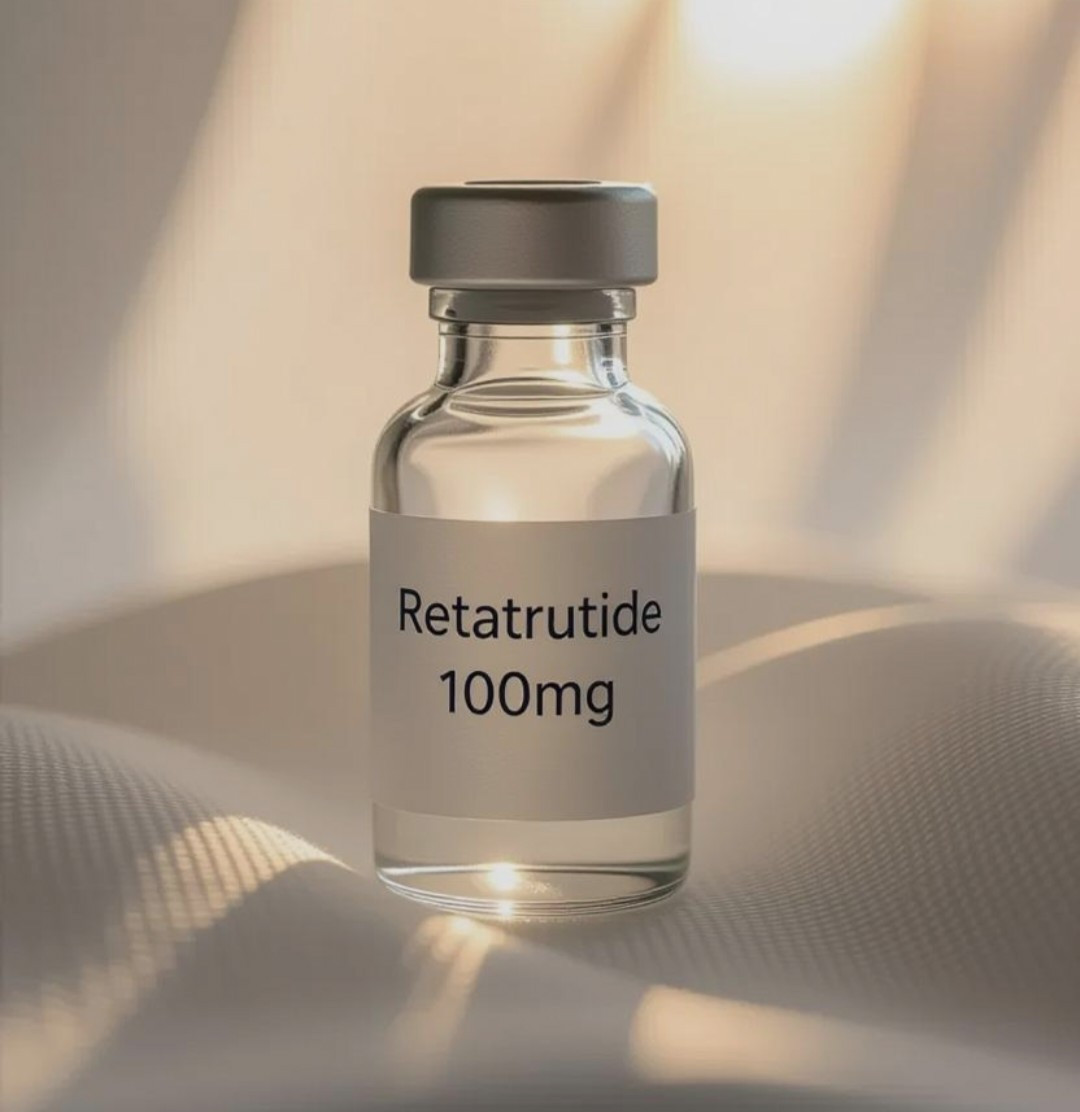Retatrutide research peptide 100mg better than ozempic 
Description
100mg powder
30ml reconstitution bacteriostatic solution
10 pack 1ml sterile syringes
For Research Use Only. Not for Use in diagnostic procedures.
This product is solely intended for research purposes as a chemical compound. Its designation permits its use exclusively for in vitro testing and laboratory experimentation. All information regarding this product provided on our website is purely educational. By law, any form of bodily introduction of this product into humans or animals is strictly prohibited. It should only be handled by professionals who are licensed and qualified. This product is neither a drug, food, nor cosmetic, and must not be misrepresented, misused, or mislabeled as such.
Overview
(For educational purposes only)
Mechanism of Action and Pharmacological Profile
Retatrutide works through a unique triple-receptor activation mechanism that distinguishes it from existing treatments for obesity and metabolic disorders.
Triple Receptor Agonism
The defining characteristic of retatrutide is its simultaneous activation of three key metabolic hormone receptors:
1. GLP-1 Receptor: Activation increases insulin secretion in a glucose-dependent manner, reduces glucagon secretion, delays gastric emptying, and decreases appetite through central nervous system effects
2. GIP Receptor: Stimulates insulin secretion and enhances the body's response to glucose while potentially improving lipid metabolism
3. Glucagon Receptor: Activation increases energy expenditure and lipid oxidation, which complements the anorectic effects of GLP-1 receptor activation
This triple agonism approach is designed to address multiple aspects of metabolic dysfunction simultaneously, potentially offering superior efficacy compared to single or dual receptor agonists[1][2].
Metabolic Effects
Lipidomic profiling reveals that retatrutide induces significant changes in energy metabolism:
· Increases in 3-hydroxybutyrate (3-HB) and 3-hydroxybutyrylcarnitine (C4OH) at 24 weeks
· Elevation of acetylcarnitine-to-free carnitine ratio (C2/C0) and medium-chain acylcarnitines
· Preferential reduction of short-chain and saturated triglyceride species
· Decrease in total dihydroceramides (DhCers) by 20.1% with the 12 mg dose[3]
These metabolic changes suggest increased adipose tissue lipolysis and enhanced fat oxidation, contributing to improved insulin sensitivity and reduced hepatic steatosis[3]. The molecule's ability to influence multiple metabolic pathways likely explains its profound effects on body weight and metabolic parameters.
Clinical Efficacy in Weight Management
Retatrutide has demonstrated exceptional efficacy for weight reduction in phase 2 clinical trials, establishing new benchmarks for pharmacological weight management.
Phase 2 Results in Obesity
A 48-week phase 2 randomized, placebo-controlled trial evaluated retatrutide in adults with obesity (BMI ≥30 kg/m²) or overweight (BMI 27-30 kg/m²) with at least one weight-related condition. The study demonstrated dose-dependent weight loss:
· 1 mg group: 8.7% reduction from baseline
· 4 mg combined group: 17.1% reduction
· 8 mg combined group: 22.8% reduction
· 12 mg group: 24.2% reduction
· Placebo group: 2.1% reduction[4]
These results represent substantial improvements over existing obesity medications, with the highest dose producing nearly a quarter reduction in body weight over 48 weeks.
Categorical Weight Loss Achievement
The percentage of participants achieving clinically significant weight loss thresholds was equally impressive:
· ≥5% weight loss: 92% (4 mg), 100% (8 mg), 100% (12 mg), 27% (placebo)
· ≥10% weight loss: 75% (4 mg), 91% (8 mg), 93% (12 mg), 9% (placebo)
· ≥15% weight loss: 60% (4 mg), 75% (8 mg), 83% (12 mg), 2% (placebo)[4][5]
Perhaps most remarkable was that 100% of participants receiving the 8 mg or 12 mg doses achieved at least 5% weight loss, a threshold associated with clinically meaningful health improvements[5].
Effects on Liver Health and Metabolic Dysfunction
Retatrutide has shown particularly promising results for reducing liver fat and improving metabolic dysfunction-associated steatotic liver disease (MASLD, formerly known as NAFLD).
Liver Fat Reduction
A substudy of the phase 2 obesity trial examined participants with MASLD and baseline liver fat ≥10% as measured by MRI-PDFF:
· Mean relative liver fat change from baseline at 24 weeks:
o 1 mg: -42.9%
o 4 mg: -57.0%
o 8 mg: -81.4%
o 12 mg: -82.4%
o Placebo: +0.3%[1][2][6]
· Similar reductions were maintained at 48 weeks:
o 1 mg: -51.3%
o 4 mg: -59.0%
o 8 mg: -81.7%
o 12 mg: -86.0%
o Placebo: -4.6%[1]
Normalization of Liver Fat
The proportion of participants achieving normal liver fat levels (
Category: Health
Tags: Reta, ozempic, glp-3, glp-1, retatrutide
Published on: October 1, 2025
Views: 23
Legal Notice: Buyers and sellers are responsible for complying with all applicable laws in their jurisdictions. XmrBazaar does not verify legality and assumes no liability. Peer-to-peer cash-for-crypto trades are permitted if not conducted as a business and are compliant with local laws; otherwise, sellers must hold any required licenses or registrations. Listings involving fraud, violence, child exploitation, or other clearly illegal goods or services are strictly prohibited and will be removed once identified. Users are encouraged to report unlawful listings.
About the trader
Just found XmrBazaar and learning about monero
N/A
-----BEGIN PGP PUBLIC KEY BLOCK----- mDMEAAAAABYJKwYBBAHaRw8BAQdAK05Y6NbptjcL6i+FBkAXNWnsc/kmJgxmQCiV tnTgVkC0FnJldGFtYXRoQHhtcmJhemFhci5jb22IlAQTFgoAPBYhBH6FlB3Hl5Yd Sgnesbh7zA4iUE4/BQIAAAAAAhsDBQsJCAcCAyICAQYVCgkICwIEFgIDAQIeBwIX gAAKCRC4e8wOIlBOP0I4AQCKTZKM5hJEb+dccvK0nRwZ5NZd2vA9Exb+OPiKiq7/ 2wD+I1NrLfr7zeg75PaM0SbWVvIa0YywqlCkRSOH3vUXrgu4OAQAAAAAEgorBgEE AZdVAQUBAQdAkEt48b8+SQQbsTwc12g85d0UgnvrD1CcMisDcmndJT4DAQgHiHgE GBYKACAWIQR+hZQdx5eWHUoJ3rG4e8wOIlBOPwUCAAAAAAIbDAAKCRC4e8wOIlBO P578AQCeZ6EtZW6dC5IZAFQh7TqcWmoE8l8DtdbNXH0/pNkB9gD/em6LplBl7bEy e03QQuvPppWwR12U9X/pU64fLHcwjAY= =jy3s -----END PGP PUBLIC KEY BLOCK-----

